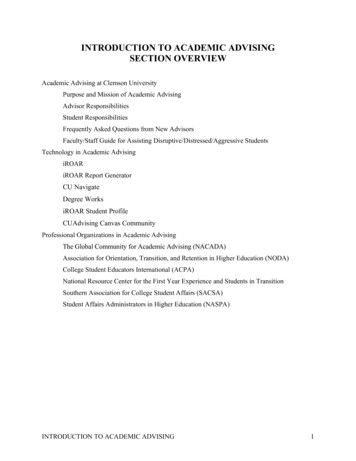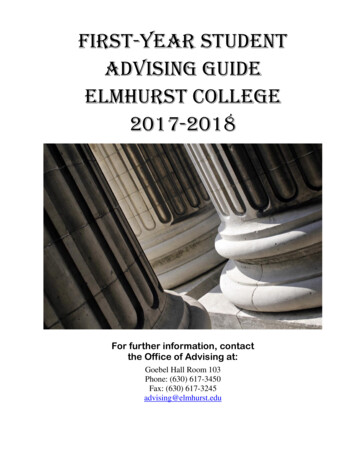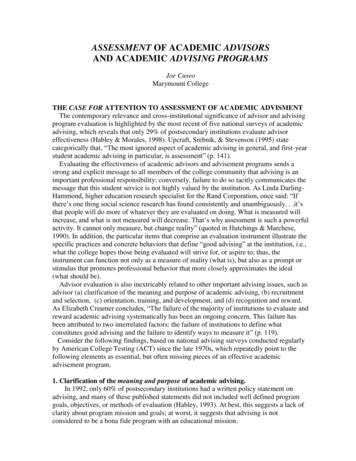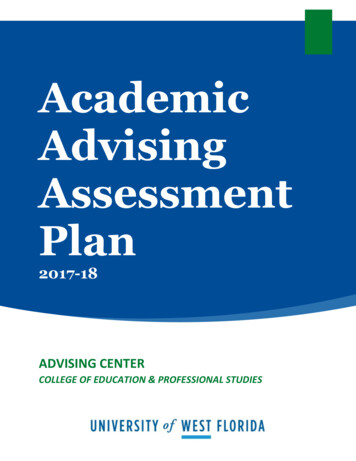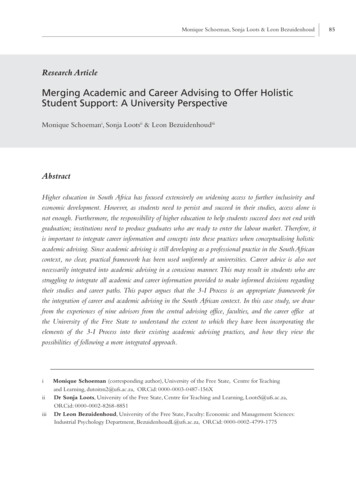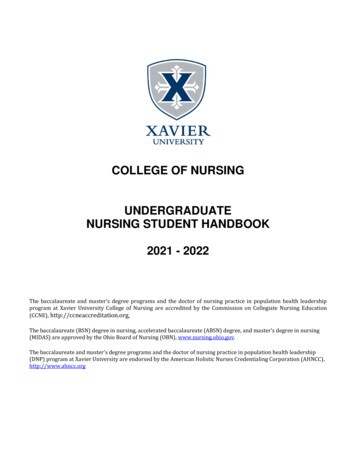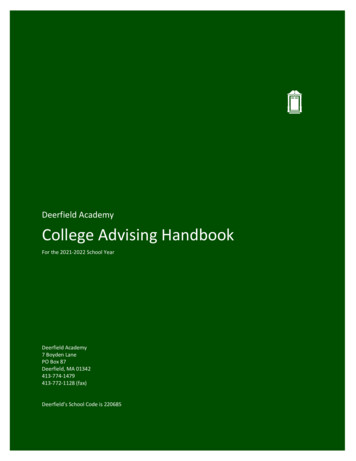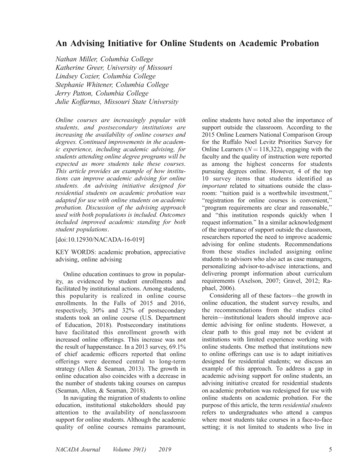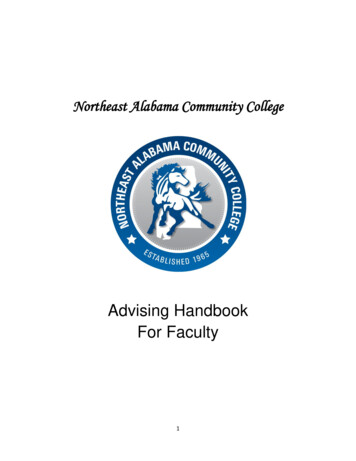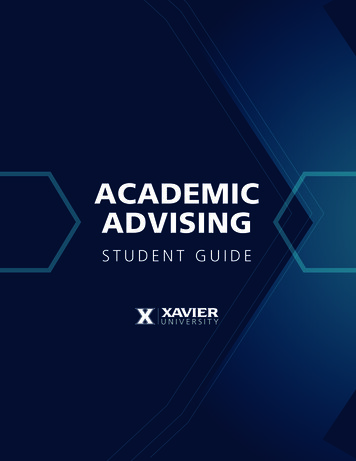
Transcription
ACADEMICADVISINGSTUDENT GUIDE
TABLE OF CONTENTSINTRODUCTION TO ACADEMIC ADVISING. . . . . . . . . . . . . 1The Advisor’s Responsibilities. . . . . . . . . . . . . . . . . . . . . . 1The Student’s Responsibilities . . . . . . . . . . . . . . . . . . . . . 1FREQUENTLY ASKED QUESTIONS . . . . . . . . . . . . . . . . . . . 2REGISTRAR’S OFFICE. . . . . . . . . . . . . . . . . . . . . . . . . . . . . 3ORGANIZATION AND DELIVERY OF SERVICES . . . . . . . . . . 3POLICIES AND PROCEDURES . . . . . . . . . . . . . . . . . . . . . . . 4TRANSFER CREDITS. . . . . . . . . . . . . . . . . . . . . . . . . . . . . . . 4PLACEMENT EXAMINATIONS. . . . . . . . . . . . . . . . . . . . . . . 4Foreign Languages. . . . . . . . . . . . . . . . . . . . . . . . . . . . . . 4Mathematics. . . . . . . . . . . . . . . . . . . . . . . . . . . . . . . . . . . 6SPECIAL ACADEMIC PROGRAMS FOR STUDENTS. . . . . . . . 8OFFICES AND SUPPORT SERVICES FOR STUDENTS. . . . . 10
INTRODUCTION TO ACADEMIC ADVISINGTHE ADVISOR’S RESPONSIBILITIESTHE STUDENT’S RESPONSIBILITIESThe responsibility of the academic advisor is to:The responsibility of the student is to: Provide students accurate informationabout University policies, programs, corecurriculum requirements, major/minorrequirements, academic advising andregistration procedures. Help students select courses each semesterthat are appropriate and/or required. Introduce students to diverse majors and/orcareer opportunities. Acquaint students with the various supportservices: tutoring programs, study groups,academic clubs, etc. Encourage and work with students todevelop good study habits. Monitor students’ academic performanceduring the academic year and recommend, ifnecessary, strategies to improve weaknessesand enhance strengths. Make proper referrals when necessary (e.g.deans, department chairs, directors: healthand wellness center, psychological services,career services center, campus ministry,learning assistance center). Consult with your advisor at least once asemester or as often as necessary. Make appointments for advising sessionsduring regularly agreed upon office hours. Notify the advisor or someone in theadvisor’s office if it is impossible to keepappointments. Be prepared for appointments duringacademic advising and priority registration.View the current online schedule of classes,have the necessary forms, some idea of thekind of courses and, if possible, alternates. Clarify some personal values and goals inadvance of the session and be prepared todiscuss them with their advisor. Follow through with appropriate actionafter an advising session (e.g., a visit to theoffice of the dean, office of the registrar,career development office, etc.). Know important dates for each semester,such as the last day to change, drop oradd classes, or the graduation applicationdeadline.Note: While advisors are available for guidance,students are ultimately responsible for satisfying alldegree requirements as spelled out in the onlineUniversity catalog, under which they entered.1
FAQSFREQUENTLY ASKED QUESTIONSQ. As a student, do I have any responsibilities?A. Yes, it’s your responsibility to be informed about all regulations and procedures required by the program and by theUniversity. In no case will a regulation be waived or an exception made because a student pleads ignorance of theregulation or asserts that the information was not given by an advisor or other authority.Q. How do I find out who my academic advisor is and where their office is located?A. In the Student Hub in “Self-Service”, click on “Student Services” select “Academic Records” and choose “StudentInformation”. To find contact information and location of their office, go to the Hub and click on Directory andenter their name. You can also access this information by logging onto Road Thru Xavier,xavier.edu/rtx. and clicking on your contacts.Q. How do I schedule an appointment with my advisor?A. Once you have their email address, you can contact them and ask how they want you to schedule an appointment.Q. How often should I meet with my advisor? What can we discuss?A. You are required to meet with your academic advisor once per semester. However, feel free to contact your advisoras often as necessary. Advisors will assist you with course planning and understanding core curriculum and degreerequirements. You can also discuss options regarding majors and minor combinations, study abroad, and youracademic performance with your academic advisor.Q. What is the difference between my advisor and my Success Coach (first and second yearstudents)?A. Your Success Coach is here to support you during your first and second years at Xavier. As part of your SuccessTeam, your coach is someone who can help you connect with other offices on campus, answer questions aboutuniversity policies and procedures, and support you in your academic and campus life. Success Coaches want tohelp you reach your own goals. We want to help you utilize campus resources, get the experiences you are hopingfor out of Xavier, and develop strong academic and study skills and time management strategies. Success Coacheswill work closely with your academic advisor, too!Q. How can I schedule an appointment with my Success Coach?A. You can schedule an appointment with your Success Coach online at xavier.edu/advising.Q. How many credit hours do I need to be a sophomore, junior or senior?A. Freshmen - Students who have earned 0 to 23.99 credit hoursSophomores – Students who have earned 24 to 54.99 credit hoursJuniors – Students who have earned 55 to 89.99 credit hoursSeniors – Student who have earned a minimum of 90 credit hoursQ. How many credit hours should I take each semester?A. The average load is 15 semester hours each semester (16 if there is a lab). A student enrolled in 12-18 credit hoursis considered full time and is charged the flat full time tuition. Anything over 18 hours is considered ‘overload’ andwill require a Dean’s signature as well as the student being charged per credit hour above full time tuition (Musicand Theatre majors may be waived from this requirement).”2
Q. What does the “I”, “VF”, “W” etc. mean on my transcript?A. VF Failure to officially withdraw (this counts as an “F” in your GPA!)W Official withdrawalI Incomplete, changed when grade is assignedAU Audit, no credit or grade earnedS Passing/Satisfactory, credit earnedU Not passing/Unsatisfactory, credit unearnedNC No credit earned, non-grade courseNR No grade reported.Q. I’ve been put on “Academic Warning”, what does this mean?A. A student is in good academic standing if they have earned acumulative GPA of 2.0 or better (a “C” average or better).Academic Warning: Any freshman in a baccalaureate degree programwhose cumulative GPA of 1.750 to 1.999 receives an academicwarningAcademic Probation: A freshman in a baccalaureate degree programwhose cumulative GPA is falls below 1.750 is put on academicprobation. An upper classman in a baccalaureate programwhose cumulative GPA is below 2.0 is placed on academicprobationAcademic Suspension: Students on academic probation who failto restore their cumulative GPA to 2.0 within two semesterswill be suspended. In addition, any freshmen or probationarystudent who receives more than one failing grade in a semesterwill be suspended.Q. What is DegreeWorks and why should I use it?A. DegreeWorks is a web-based tool to help students plan for graduation.Some of the benefits of using DegreeWorks are: seeing how far you’vecome and how far you still have to go, a GPA calculator that cancalculate your GPA based on grades you expect to earn for the termand a “What If” option to see how adding a major/minor would affectgraduation. For more information on DegreeWorks, visit xavier.edu/degreeworks.Q. What’s the difference between “dropping” a class and“withdrawing” from a class?A. A class that is “dropped” from your schedule through the 7th calendarday of the semester will be dropped and not appear on your academicrecord. However, after the 7th day of the semester, you “withdraw”from the class and a “W” will appear on your academic transcript. Thegrade of “W” does not affect your GPA and you will still be considereda full-time student. The first step you need to take before adding,dropping or withdrawing from a class, is to check with your academicadvisor. They will be able walk you through this process.Q. Where do I look if I have more specific questions?A. For more specific information on policies and procedures refer to theonline catalog at catalog.xavier.edu. For specific questions withinyour major, please consult your assigned academic advisor.3REGISTRAR’S OFFICEFor information onregistering for classes,withdrawing from classes andto find some great tutorials onRegistration and Self-Service,visit xavier.edu/registrar.You can also contact them atxureg@xavier.edu.ORGANIZATION ANDDELIVERY OF SERVICESAcademic advising is providedfor students in College ofArts and Sciences, College ofProfessional Sciences, Collegeof Nursing and WilliamsCollege of Business and forstudents in Adult ProfessionalEducation at Xavier (APEX).Exploratory and first yearBiology and Biomedicalstudents are assigned academicadvisors in the Student SuccessCenter. Students with othermajors are assigned advisors inthe academic departments ofthe colleges.In addition, all traditional firstand second year students in allmajors are assigned to a successcoach in the Student SuccessCenter. A listing of academicadvisors/success coaches in theStudent Success Center and ofthe three colleges can be foundonline at xavier.edu/academicadvising .
PLACEMENT EXAMINATIONSFOREIGN LANGUAGESPOLICIES ANDPROCEDURESUndergraduate AcademicPolicies and Regulations catalog.xavier.eduUndergraduate RegistrationPolicies and Procedures xavier.edu/registrarThe University’s Core Curriculum xavier.edu/core/core-guideTransfer Students xavier.edu/core/facstaff/transferstudentsTRANSFER CREDITSThe College Board AdvancedPlacement ExaminationsAll students must take a placement test or meet with thelanguage coordinator to determine placement in the foreignlanguage they studied prior to entering Xavier. Their score in thistest determines the level at which they begin the study of thatlanguage at Xavier. A student must demonstrate proficiency bysuccessfully completing the 201 level of any language in order tosatisfy the Foreign Language requirement for Core. The followingcourses fulfill the requirement depending on placement.1) Languages:ARAB 101 – 102 – 201 – 202GREK 101 – 102 – 201 – 202ASLN 101 – 102 – 201 – 202ITAL 101 – 102 – 201 – 202CHIN 101 – 102 – 201 - 202JAPN 101 – 102 – 201 – 202CLAS 173 – 174SPAN 101 – 102 – 201 – 202FREN 101 – 102 – 201 – 202CHIN 101 – 102 – 201 – 202GERM 101 – 102 – 201 – 202For each language:101 is Elementary I102 is Elementary II201 is Intermediate I202 is Intermediate II2) Classics: xavier.edu/apchart173 is Introduction to Biblical HebrewInternational BaccalaureateCredit174 is Readings in Biblical Hebrew xavier.edu/ibchartXavier Approved CLEPExaminations xavier.edu/clep-chartTo arrange forCLEP testing, contact:Northern Kentucky University(859) 572-6373 or UC - Clifton(513) 556-7173.Visit clep.collegeboard.org formore testing locations.To have grades sent to XavierUniversity, please use schoolcode 1965.3) LatinLATN 101 (or 111), 102 (or 112), 201 and 202For Latin:101 is Elementary Latin I (an introductory course for truebeginners)111 is Intensive Elementary Latin I (an introductory course forthose with limited background and Honors AB beginners)102 is Elementary Latin II (for those who have completed 101)112 is Intensive Elementary Latin II (for those who havecompleted 111)201 is Intermediate Latin I: Prose (for those who havecompleted 102 or 112)202 is Intermediate Latin II: Poetry (for those who havecompleted 2014
Language Placement:The Department of Classics and Modern Languages now offers a new 103 course in Spanish, French,and German. This course starts at the very beginning of language acquisition, and moves at anaccelerated pace through 101 and 102. In other words, FREN/GERM/SPAN 103 101 102; 103 is notthe next step, or a higher level than 102. After completing 102 or 103, the next step in a student’scourse of language study would be 201.) A crucial benefit of 103 is that it encourages students tostick with the language they took in high school and see it through to 201 proficiency, and to do sowith only two courses (103 201), not three (101 102 201).Students who take 103 include:1. Students who have had two years or more of the language in high school but do nottest at the 102 level. These students cannot take 101 because of their prior experience inthe language, but they often feel unprepared to start with 102. FREN/GERM/SPAN 103encourages students to stay with the language they started in high school by allowing themto take 201 as their next class, thereby completing the new core language goal of 201 withjust two classes.2. Students who took two years or more of the language in high school and test into 102 inthat language, but still do not feel prepared to take 102.3. Students who have not studied the language previously, but who are very motivated tomove at an accelerated pace.4. This course reviews Elementary vocabulary and grammar, and moves at an accelerated pacethrough material normally covered in the 102 level.FREN/GERM/SPANFREN 103: The principal goals of language study are to practice the four language skills (speaking,listening, reading and writing) in order to learn to communicate in French (talk with others,express ideas in writing, read and understand what others have written) and learn about thefrancophone world.GERM 103: The principal goals of language study are to practice the four language skills (speaking,listening, reading and writing) in order to learn to communicate in German (talk with others,express ideas in writing, read and understand what others have written) and learn aboutcultures in which German is spoken.SPAN 103: Students will practice the three modes of communication (Interpersonal, Interactive andPresentational) as they work towards developing language proficiency, both in speaking andwriting.LATN 111 and 112The Department of Classics and Modern Languages now allows LATN 111 and 112 to be consideredequivalent to LATN 101, 102, and 201, thereby fulfilling the University Language Core. Similar to103s in modern languages, LATN 111 starts at the very beginning of Latin grammar and syntax andmoves at an accelerated pace; in LATN 112 students finish the grammar text by early February, i.e.after about 4-5 weeks, and then read Latin prose for the remainder of the semester, 9-10 weeks.The amount of Latin covered in these two accelerated semesters is equivalent to three semesters ata slower pace.Students who take LATN 111 and 112 include:1. Students who have had two years or more of Latin in high school but do not test at LATN102 level. These students cannot take LATN 101 for language core credit because of theirprior experience in the language, but they often feel unprepared to start with LATN 102,which is not offered until spring.5
2. Students who took two years or more of the language in high school and test into LATN102, but still do not feel prepared to take LATN 102 or do not want a semester of college togo by without starting on their language core.3. Students who have not studied the language previously, but who are highly motivated tomove at an accelerated pace. This includes PPP, University Scholars, and Classical Humanitiesmajors as well as other motivated students.4. All incoming Honors Bachelors of Arts (HAB) students who have not had Latin or had onlyone year of Latin in high school.Completion of LATN 112 in spring will allow HAB students and Classical Humanities majors to takeLATN 211 the following fall semester and keep up with their major language requirements. Pleasecontact Dr. Trnka (trnkaj@xavier.edu) with any questions.MATHEMATICSAll incoming students who do not present qualifying advanced placement or transfer credits inmathematics must take the mathematics placement assessment. For details, contact the chair ofthe Department of Mathematics. Students should consult their academic advisor regarding whichMath classes are appropriate considering their major and placement. The mathematics placementcategory (105, PRE, ELC, or ADV) should be interpreted as follows:105Students must first take MATH 105 Fundamentals of Mathematics before attempting any othermathematics course. This course does not fulfill the Mathematical Perspectives requirement of theCore Curriculum, but does count towards the 120 credit hours for graduation.PREStudents should not take MATH 105, and should choose from any of the following courses:MATH 113 Mathematics of FinanceMATH 115 Topics in Applied MathematicsMATH 116 Elementary Statistics (MP)MATH 120 Elementary Functions (MP)MATH 125 Mathematical Perspectives (MP)MATH 169 Pre-calculusCSCI 170 Computer Science I (MP)Courses marked (MP) fulfill the Mathematical Perspectives requirement of the Core Curriculum.Students without specified mathematics requirements are encouraged to consider MATH 125Education majors (only) are also prepared to take:MATH 201 Foundations of Arithmetic – ECED (MP)MATH 202 Geometry and Measurement – ECED (MP)MATH 211 Foundations of Arithmetic – MCED (MP)MATH 212 Geometry and Measurement – ECED (MP)ELCStudents should not take MATH 105, 113, 115, 116, or 120, but should choose from any of thefollowing courses:MATH 125 Mathematical Perspectives (MP)MATH 140 Concepts of Calculus (MP)MATH 156 General Statistics (MP)6
MATH 169 PrecalculusCSCI 170 Computer Science I (MP)Courses marked (MP) fulfill the Mathematical Perspectives requirement of the Core Curriculum.Students without specified mathematics requirements are encouraged to consider MATH 125.Education majors (only) are also prepared to takeMATH 201 Foundations of Arithmetic – ECED (MP)MATH 202 Geometry and Measurement – ECED (MP)MATH 211 Foundations of Arithmetic – MCED (MP)MATH 212 Geometry and Measurement – ECED (MP)Business majors may, in addition, choose to takeBAIS 210 Statistics for Business IADVStudent should choose from any of the following courses (depending on the mathematicsrequirements of the major program):MATH 125 Mathematical Perspectives (MP)MATH 140 Concepts of Calculus (MP)MATH 156 General Statistics (MP)MATH 170 Calculus I (MP)CSCI 170 Computer Science I (MP)Courses marked (MP) fulfill the Mathematical Perspectives requirement of the Core Curriculum.Education majors (only) are also prepared to takeMATH 201 Foundations of Arithmetic – ECED (MP)MATH 202 Geometry and Measurement – ECED (MP)MATH 211 Foundations of Arithmetic – MCED (MP)MATH 212 Geometry and Measurement – ECED (MP)Students without specified mathematics requirements are encouraged to consider MATH 125.Business students may, in addition, choose to take BAIS 210 Statistics for Business IStudent studying calculus may begin with MATH 171 Calculus II (MP) provided he or she presentsAP or transfer credit for MATH 170; likewise, student may begin with MATH 220 Calculus III (MP)provided he or she presents AP or transfer credits for MATH 170 and 171.Students who wish to study mathematics more deeply may also consider takingMATH 222 Applied Linear AlgebraMATH 225 Fundamentals of Higher Mathematics (MP)Such students should also consult a mathematics advisor.7
SPECIAL ACADEMIC PROGRAMS FOR STUDENTSIn addition to the major, students may be interested in one of the following programs at Xavier.A description of the various programs follows:Classics and Philosophy Honors ABEstablished in 1948, the Classics and Philosophy Honors AB program is the University’s first andoldest honors program. True to Xavier’s Jesuit heritage, HAB emphasizes the interdisciplinary studyof classics and philosophy. Students study classic texts of Western civilization in the original Latinand Greek while fostering deeper understanding of the values and ideals they embrace. Studentsaccepted to the HAB program fulfill the University’s core curriculum requirements and completeadditional hours in the classical languages and philosophy. Most HABs double major (e.g. English,Psychology, Economics) or complete a Natural Science minor in preparation for the MCATs as premeds. For additional information about the program, students should contact the following person:Dr. Thomas Strunk810 Schott Hall, 513-745-1930strunkt@xavier.eduEducation AbroadXavier University believes that a study abroad experience as part of a student’s academic programis of great educational value. Students are encouraged to explore this option with their academicadvisor and an education abroad advisor in the Center for International Education. There areoptions for full-semesters abroad as well as summer and break options.Visit Xavier.edu/study-abroad for more information.LeeAnn Scherbauer, Education Abroad Advisor230 Gallagher Student Center, 513-745-2815scherbauerl@xavier.eduInternational Student & Scholar Services (ISSS)ISSS offer orientation, advising, and continuous support for international students and scholarsthroughout their studies at Xavier University. International students and scholars must navigatethrough complicated federal visa regulations in order to maintain their legal visa status. ISSSprovides orientation, F-1 and J-1 visa advising, and opportunities for leadership and growththrough cross-cultural programs and events. For more specific information contact:Tsvety Karaivanova, International Student Advisor230 Gallagher Student Center 513-745-2804karaivanovat@xavier.eduPre-LawAmerican law schools prescribe neither specific courses nor a specific major for pre-law study. Theypay particular attention to students engaged in a broad program of high quality in liberal arts,including the sciences and business. The degree program should educate the students to assimilatedifficult documents and to interpret factual data, to think logically and creatively, to expressthemselves well orally and in writing, and to acquire a critical understanding of the humaninstitutions and values with which the law deals.Sean Rhiney, JD126 Alumni Hall, 513-745-3968rhineys@xavier.edu8
Pre-Professional HealthIt is possible to prepare for many different health professions while at Xavier University. A studentinterested in nursing, exercise science, or radiological technology should see an academic advisor inthe specific program. Students interested in preparing for professional health programs in allopathicand osteopathic medicine, dentistry, podiatric medicine, veterinary medicine, optometry, physicaltherapy, chiropractic medicine, physician assisting or pharmacy should meet when needed with thedirector of pre-professional health advising, Kara Rettig-Pfingstag. Ms. Rettig-Pfingstag offers variouspre-professional health advising workshops and programming throughout the school year as well.Contact Kara Rettig-Pfingstag or Dr. Jennifer Robbins for assistance about career choices, academicprograms in health services and preparation for admission to professional health schools.Ms. Kara Rettig-Pfingstag, DirectorPre-Professional Health Advising105 B Albers, 513-745-3691rettigk@xavier.eduDr. Jennifer Robbins, Chair, (Biology)2 Albers, 513-745-3624robbins@xavier.eduPhilosophy, Politics and the Public (PPP)Philosophy, politics and the public (PPP) is an interdisciplinary honors program dedicated to arigorous and wide- ranging examination with a global perspective of the theoretical foundations,historical conditions and practical considerations that sustain the idea of “the public.” Studentswho are invited to join this challenging program will investigate dimensions of public experiencefrom multiple disciplinary points of view. Criteria for admission into the PPP honors programincludes the completion of an application form and essay. For additional information about theprogram, students should contact the following person:Dr. Timothy Brownlee207 Hinkle, 513-745-3697brownleet@xavier.eduUniversity ScholarsUniversity Scholars is an honors program designed for talented students in every college and major.The program brings Honors peers together in small classes that engage content with greater depthand rigor, emphasizing learning across the university and engagement with the world. Studentstake six Honors courses over the course of four years, choosing from a range of options that overlapwith one’s core and major requirements. For additional information about the program, studentsshould contact the program’s Director:Dr. Stephen Yandell302 Hinkle Hall, 513-745-3598yandell@xavier.eduSmith ScholarsThe Smith Scholars Program is a Williams College of Business (WCB) undergraduate, cohort honorsprogram. Smith Scholars students begin as freshmen in an intensive program that integrates thestudy of the liberal arts with the WCB core curriculum in a rigorous, purposeful, and innovativeway. This unique cohort of Smith Scholars studies a range of courses in both the business and liberalarts curriculum thereby immersing themselves in the study of the foundational texts of philosophy,history, and economics. Building upon this foundation, Smith Scholars complete courses leading totheir selected WCB major with a minor in Political Economy. The minor is designed to engage SmithScholars in a rigorous examination of economic theory and its applications, the legal and regulatoryenvironment of business, and the financial markets that integrate these forces.Dr. Stephen Frankel203 Hinkle Hall, 513-745-3668frankel@xavier.edu9
OFFICES AND SUPPORT SERVICES FOR STUDENTSACADEMIC AND CAREERRESOURCESCareer DevelopmentConaton Learning Commons,Suite 530 & Smith Hall, reerCenter for InternationalEducation (CIE)Phone 513-745-2864Gallagher Student Center,Suite 230The Connection Center513.745.3881First Floor Conaton ematics Tutoring Lab513.745.3069Conaton Learning Commons,Room g Center513.745.2875Conaton Learning Commons,Room 400xavier.edu/writing centerOffice of Academic Support513.745.32805th Floor, Conaton LearningCommonsxavier.edu/academic-supportOffice of Disability Services513.745.3280Conaton Learning CommonsRoom 514xavier.edu/disability-servicesStudent Success513.745.3141Conaton Learning Commons(CLC), 5th TRiO-Student Support Services513.745.3758Conaton Learning Commons,Suite 515xavier.edu/sssCampus Events, Activities, andInvolvementRecreational Sports513.745.3208The Health United Building(HUB)xavier.edu/recsportsStudent Involvement513.745.3004Gallagher Student Center, mentCenter For Diversity andInclusion513.745.3181Gallagher Student Center, Suite280CDI@xavier.eduHEALTH, WELLNESS, ANDSAFETY RESOURCESCampus Dining513.745.4874Fenwick Hallxavier.edu/diningdining@xavier.eduCampus Police513.745.1000 (Emergency)513.745.2000 (Non-Emergency)1648 Musketeer Drivexavier.edu/policexavier.edu/safetyMcGrath Health and WellnessCenter513.745.3022The Health United al Services Center513.745.3531Sycamore House, Winding WayAvenuexavier.edu/psychologicalservices10Title IX PIRITUALITY AND JESUITMISSION AND IDENTITYCenter for Mission and Identityxavier.edu/jesuitresourceThe Dorothy Day Center forFaith and Justice513.745.3567xavier.edu/cfjADDITIONAL RESOURCES FORSTUDENTSRegistrar513.745.3941 phoneMusketeer Mezzanine inFenwick Placexavier.edu/registrarCommuter Services513.745.3824Office of Residence Life,Musketeer Mezzanine inFenwick Placexavier.edu/commuterParking er.edu/parkingResidence Life513.745.3203Musketeer Mezzanine inFenwick t Financial Services513.745.31421st Floor, Schott dent Identification Card(ALL Card)Xavier ConnectX,513 745-3374Musketeer Mezzanine inFenwick Placexavier.edu/allcard
A. A student is in good academic standing if they have earned a cumulative GPA of 2.0 or better (a "C" average or better). Academic Warning: Any freshman in a baccalaureate degree program whose cumulative GPA of 1.750 to 1.999 receives an academic warning Academic Probation: A freshman in a baccalaureate degree program
